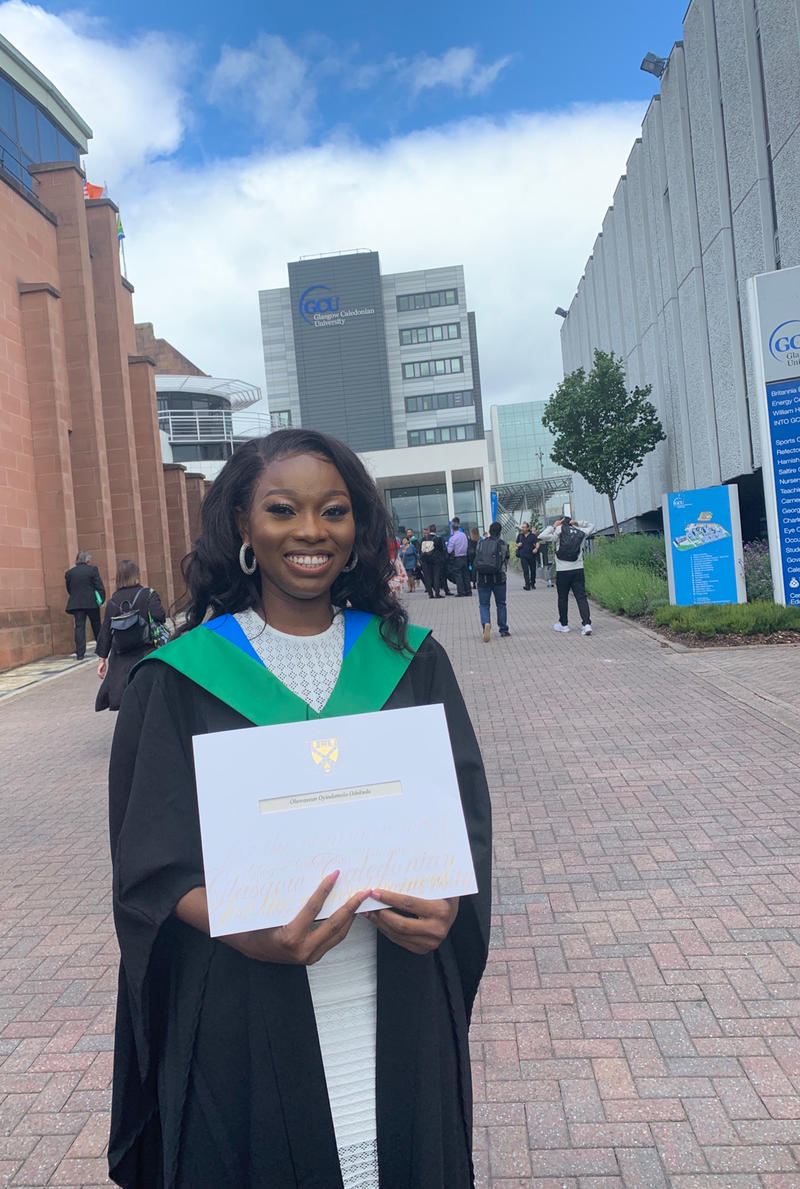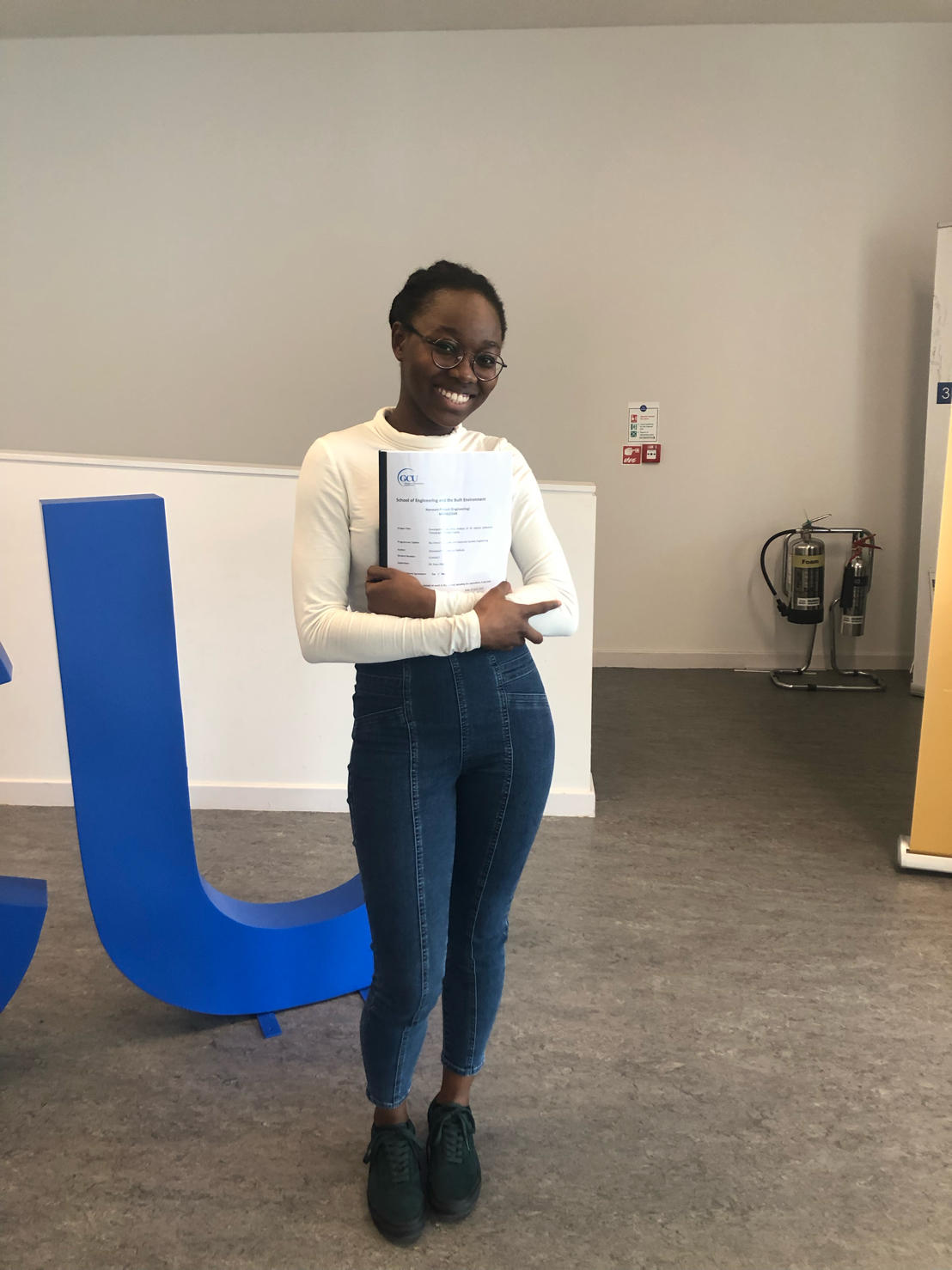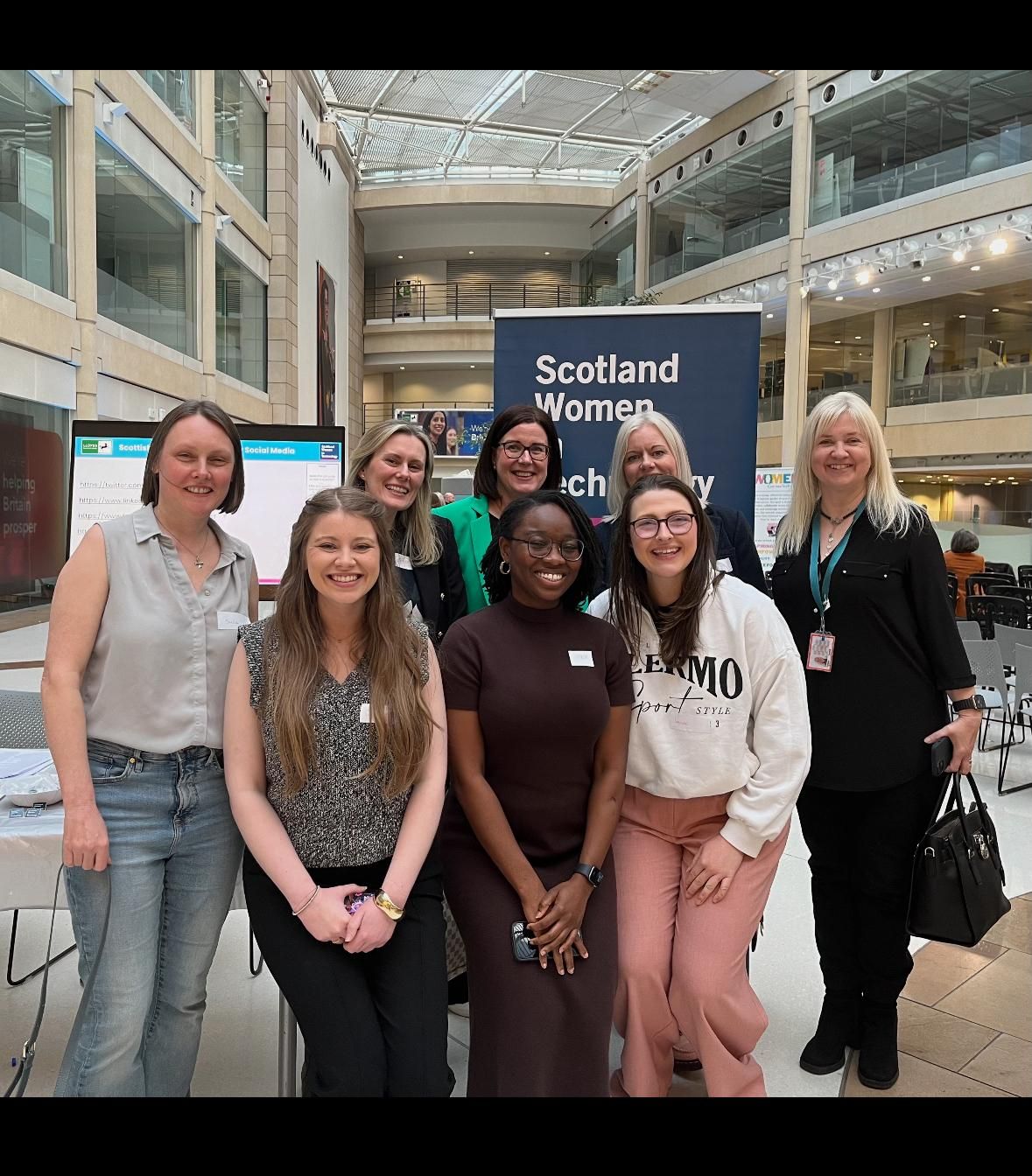Oyin Odukudu is a Software Development Engineer in Test (SDET) at the BBC in Glasgow. A first-class graduate in Computer Software Engineering from Glasgow Caledonian University, she has over seven years of experience in test automation, software quality, and agile team leadership. In this interview with Diaspora Wire, she shares her perspectives on career and personal growth and the challenges of migration in the UK.

What’s your day-to-day routine as Software Development Engineer in Test (SDET) at the BBC?
I joined the BBC in April; before that, I was working in a financial institution. On a day-to-day basis, I work in the Audio Content Metadata department, mostly handling the BBC Sounds platform, which covers podcasts, radio, and music services. My role involves testing the endpoints for various services to make sure everything works as expected, especially the schedules on the front end that listeners see. For example, if a show airs only on Thursdays at 5 p.m., I make sure the channel reflects that correctly for listeners. I also test services that need to be removed or updated. So, I’m essentially a software test engineer, not just a software engineer.
What do you like about the job?
It’s interesting and challenging as well, especially since I was mostly working on front-end development before joining the BBC. Here, I work more in-depth on the back-end, which I find really interesting. I learn a lot every day, get to ask questions, and see how things are done behind the scenes. There are challenges, of course, but I have a strong support system, so whenever I hit a roadblock, I can reach out for help. Overall, I really enjoy my job.
What inspired your decision to study Computer Software Engineering at Glasgow Caledonian University, and how did you prepare for the move from Nigeria?
I’ll start with my journey initially. I planned to go to the University of Ibadan(UI) to study medicine because that’s what I wanted to do. But I missed the cut-off by just two points. There was also something called a second-choice course, which I also missed, I don’t know how I managed that. From that point, my other option was basically studying abroad.
So, what informed my decision to go into engineering? My dad, my mom, my uncle, and I discussed it. If I were going to study medicine in the UK, I couldn’t enter the university directly. I would have had to do an undergraduate degree for four years first, and then go to a medical school. Considering the cost, and the fact that I didn’t study in the UK or do A-levels, engineering became a more practical choice. It wasn’t completely new to me; I had always been interested in computing or medicine, so engineering was something I naturally slid into. I applied the same month. I decided not to submit my second choice at UI, and I got an admission the following month. That’s when I started my processing.
Why Scotland? My uncle lives in Scotland with his family, so it was a default option for my parents. I would have a support system on the ground, and I wouldn’t be lonely. I could always visit them from the university or rely on them if I needed help. That’s really why Scotland was my choice.
As for preparing for the move, it was mostly about getting my paperwork ready and organizing my plans after receiving admission. Beyond that, it was straightforward—it really is as simple as I’ve described.

How was settling into academic life at GCU compared to your experience studying in Nigeria?
I didn’t go into year one directly; I did something called a foundation program. From foundation, I progressed into year two. The foundation program had a smaller class, and we covered similar subjects to those in year one. We also had compulsory English classes because the university knew we were all coming from different countries.
“The English classes were really helpful for me. They taught me the style of writing essays, how to answer assignment questions, and how to handle tutorials. We also had another class focused on general knowledge about the UK and how to interact with people here. I can’t remember the exact name of the course, but those two classes were the most important alongside what year-one students took. They really helped me settle in properly.”
When I moved into year two, it wasn’t abrupt. We already had some exposure through the foundation program, which was affiliated with GCU. We used the lab classes in the university itself, and the tutorial structure was similar to year one. I didn’t feel different from the year one students at all; it was seamless. In terms of academic differences compared to Nigeria, I would say I took fewer courses than my colleagues in Nigeria. Also, the Scottish accent and way of speaking was a bit different, but that was something I got used to over time.
When I spoke with my friends in Nigeria, they had around nine or eleven subjects that semester, but I only had three or four. We (GCU students) focused mainly on subjects related to what we were studying. In Nigeria, you often cover a broad range of subjects before narrowing down toward the end. I was in engineering, specifically computer electronics, so I didn’t study anything outside my field, like economics. In my first year, I took maths, introduction to computing, introduction to cybersecurity, and additional maths. Each semester was focused on what I was going to specialize in. Even with just four subjects, we had tutorial classes, assessments, and main exams, so the workload was streamlined to what I came to the university to study.
In terms of culture, the university setting in Scotland and England was manageable. Teachers spoke clear English in class, knowing that international students needed to understand. Outside of class, people spoke with a Scottish accent, but that wasn’t new to me because I had visited Scotland in 2013 with my mum and sisters. So, the accent wasn’t a shock. Of course, if I didn’t understand someone, I would ask them to repeat themselves, and that’s still true at work. I say, “Could you repeat yourself again?” and people don’t find it insulting.
You graduated with a first class. What challenges did you face academically, in terms of program rigor and effort required?

One of the main challenges was working in groups. I honestly didn’t like group projects because I often had to over-pull my weight. From year two onwards, we had integrated projects in which we had to create a prototype, prepare presentation slides, and write reports with a specific word count. Many group members would participate in the first few weeks but then disappear. By weeks 10 to 12, when submissions were due, some wouldn’t contribute at all or even show up for presentations.
I realized that if I wanted to succeed, I had to carry my weight and sometimes more. You couldn’t report non-participating members because lecturers would still require you to submit your quota. Everyone would get the same grade regardless, so fairness wasn’t guaranteed. The only time grades differed was in a particularly strict integrated project. I focused on completing my own quota because of the effort and financial resources I had invested in my education and because I knew what I wanted to achieve afterward.
Another challenge was being one of the very few girls in my classes. In most courses from years one to three, I was the only female, or one of two or three. It was only in year four, during a combined management course for all engineering departments, that I saw more women.
Being in a male-dominated environment meant I had to interact with many of the guys to navigate group work and daily class life. It would have been nice to have more women to connect with and share small jokes or experiences, but I managed.
Overall, it wasn’t easy or “all rosy,” but I knew I had to put in the effort. I knew the job market would be competitive, and with mentors advising me, I understood what I needed to achieve and how to be involved. Even if I didn’t graduate with a first-class degree, experience mattered just as much. It required persistence, focus, and over-delivering to ensure I was prepared for future opportunities.
Can you walk me through your journey finding a tech job in Scotland?
The labour market is tight everywhere. I speak from experience. I left my previous job in January, but before leaving, I had already been applying for my current role. I started applying in October 2024, and eventually got my offer in February of the following year, though I didn’t start until April. So I had been applying for about five months.
Back in my second year of university, I took a gap year to do a one-year internship before my final year. During that gap year, my aunt in London, who runs a training academy for people breaking into tech, persuaded me to join one of their programs. I was reluctant at first—I didn’t really want to travel—but I went.
The training academy covers a range of roles: Scrum master, business analyst, software development, software testing, and a few others. She runs it with her husband, and I had also been a tutor on their platform a few times over the years. For me, I joined their software testing training, which aligned closely with what I was studying at the university. At uni, I was doing both software and hardware, but the training focused mostly on software; testing real applications that people actually use was fascinating and really captivating.
While doing my one-year internship, I continued participating in the online training because it was virtual. When I returned to the university for my final year, I kept up with the training program. It was meant to be a three-month course, but I stayed longer because it was an excellent learning opportunity. During my final year, I began applying for jobs and asked if I could use the academy as a reference; they agreed.
By the time I graduated, my CV included multiple experiences: my one-year internship in the UK, the internship with the training academy, and a three-month internship in Nigeria with Nigerian Breweries. In addition, I had part-time jobs in retail and the food and beverage industry. My CV focused mainly on the technical skills I had gained from these three main experiences.
I applied to many jobs, but interestingly, the role I eventually got wasn’t through a direct application. The company saw my LinkedIn profile—which I make sure to regularly update with even small achievements—and reached out to ask if I was interested in the position.
You earlier mentioned you had to forgo an opportunity for a master’s degree?
Yes, while all this was happening, I had also applied for a master’s program—I got an offer to study something related to AI. But on the same day, the company asked me if I was interested in a role, I said yes. They requested my CV, and we scheduled a virtual interview.
The next stage was supposed to be a physical interview in their Edinburgh office. The virtual interview was meant to include three people, but only one showed up. I called that “God’s favor.” After passing the virtual interview, the next day I was invited for the in-person interview. It was supposed to be with two people, but only one person was there, who eventually became my senior line manager.
During the interview, we mainly talked about my move to the UK, my university experience, and the company. Compared to the virtual interview, this was less technical—it felt more like an informal conversation to get to know me. Interestingly, my interviewer mentioned how he wished companies gave opportunities to non-British citizens, not just British people. A week later, I got the job and decided to decline my master’s degree offer.
The master’s program wasn’t fully funded, so my parents would have been paying. At the time, I also needed a visa sponsorship to work in the UK—there was no post-study work option then. So securing a sponsored job was crucial. I was with that company for five years before moving to the BBC. Looking back, I always tell people that if they’re moving to the UK, they should understand the job prospects for the course they want to study. Many people come here for a master’s degree, and I usually stress that it is important to consider whether the course will realistically lead to the career opportunities they want.
How important is it to understand the job market in the UK before coming for a master’s degree, and what strategies would you recommend for finding part-time or graduate jobs?
It’s really important to understand the job market before coming to the UK. For example, if you’re studying fields like HR or business management, companies often favor people of their own nationality or background, unless your CV is exceptional. You need something that really stands out—something that proves you’re better than local candidates.
I always advise people to check their job prospects early. A master’s program is only one year, and if you start applying for jobs while you’re submitting your dissertation, it’s already too late in my opinion. When you first arrive, in the first month, you should already start applying for jobs, get your National Insurance number, and networking. If you have contacts on LinkedIn or know companies you’re interested in, reach out to them. Even if they don’t have paid positions, you could ask for an unpaid internship to gain experience and learn under their professionals. There are also free training opportunities online—LinkedIn, Coursera, and other platforms—so you can gain certifications and knowledge that employers value.
Most employers look at your experiences, certifications, exams, and basic knowledge. For instance, the job I got, I didn’t know everything before starting. I knew the basics, and that helped me secure the role. So while looking for part-time or temporary jobs, also keep your long-term career goals in mind. For graduate jobs in the UK, most graduate programs close applications around October to November for the following September intake. If you don’t start applying early, you could miss opportunities.
Networking is crucial. Speak to people already in the country and ask them to review your CV because CVs in the UK are very different from those in Nigeria. There are different types of CVs even within the UK—one for professional roles and one for part-time or casual work. It’s important to tailor your CV accordingly.
For part-time jobs, I used connections within my community. For example, I got a part-time job in the food and beverage industry through a friend. They were looking for people to staff kiosks at football stadiums. I reached out and asked if shifts were available. Because I was part of a local society, I also had access to job postings in the community and church groups. They didn’t even ask for my CV initially, just online training. For part-time work, it’s often about availability and willingness to work, rather than formal applications.
So, my advice is: start early, network, tailor your CV, leverage community connections, and take advantage of online training to improve your chances. Balancing part-time work with studies under the 20-hour rule is possible if you’re organized and proactive.
Any personal advice on CV, personal branding and certifications for tech candidates?
If you have experience running a business or working in a company, even in retail or clothing, you can translate that into valuable work experience on your CV. For example, you can highlight the soft skills you’ve developed—managing people, customer service, assisting clients, ensuring products are organized, and responding to queries. Most of these soft skills are already part of the job description for many positions, so you just need to pick them up and present them clearly on your CV, updating it to reflect your experience.
For part-time jobs, often you don’t have to apply online. Many opportunities are found through networking, by reaching out to people directly. Being part of a community is very useful; for example, some church or local groups post job openings. You can let people know you’re looking for work, and they may refer you or connect you with opportunities. That’s largely how I found my part-time roles, and it’s a method many people still use today.
Regarding technical skills and certifications for my field, I’d recommend starting with certifications specific to your area of expertise. For software testing, there are different levels of certification: foundation and advanced. I suggest taking the foundation course first. If your focus is cyber security, there are specialized certifications for that. For architectural or software development roles, AWS certifications are valuable.
You can also find online training on platforms like Coursera and Udemy. Some courses require a small fee—around £10–15—to obtain a certificate, which can then be added to your CV. Professional exams typically provide official certificates after completion. It’s important to keep these certificates safely and not just in your email inbox. Employers often ask for evidence or certificate numbers to verify your credentials, so having them organized and accessible is crucial. In a nutshell, updating your CV with transferable soft skills, actively networking for opportunities, and obtaining relevant technical certifications are key steps for building a strong profile in tech and software testing.
Many Africans migrate to the UK with hopes of tech opportunities, but job demand often outweighs supply, causing frustration. How do you view this challenge, and what roles should African leaders and professionals play in addressing it?
Like you said, things are really, really difficult now. Many people are struggling to find jobs, let alone secure visa sponsorship roles. Meanwhile, the number of people moving to the UK—especially from Nigeria, West Africa, and other parts of Africa—continues to rise. Their hopes for better opportunities remain very high. But when they get here, the jobs are limited. What I would say is, from a professional standpoint, you really need to understand the job market before coming in. Most people come for a master’s degree program, and I’ve barely seen people come here for undergraduate studies. A lot of them don’t know the realities of the market or the timelines they have to navigate. My advice is, from the very first month, try to understand the job prospect for your field. Reach out to people already in the country, revamp your CV to fit the UK standards, and try to get experience—paid or unpaid—that aligns with your career goals. Even unpaid internships or training opportunities can give you an edge because it allows you to learn, gain exposure, and build a network.
For African leadership back home, I think there’s a responsibility to guide citizens about the realities of migration. People should be informed about the sectors where opportunities are available, the skillsets in demand, and how to prepare themselves before leaving. For individuals, it’s about taking control, learning relevant skills, and sometimes creating your own opportunities if the market is tight. You need to be proactive and strategic because the demand is high, the supply is limited, and thousands won’t get those sponsorship jobs.
How can Nigerians take control of their careers—whether transitioning fields, working remotely, or seeking opportunities abroad—and how can migrants realign unplanned roles with their passions and long-term goals?
Yeah, I think I’m going to start with the last part of the question, which is taking the bull by the horn. For people currently in Nigeria, what can probably be done—and what I’ve seen people do—is reposition themselves in areas they’re interested in. You could be in HR but interested in product management. What people do is upskill by taking professional courses and then doing internships with companies willing to take them on. After that, they can apply for remote jobs while still working in Nigeria, earning in the currency of the company that employs them.
I’ve seen people use platforms like Upwork and other freelancing companies. Some manage two or three jobs simultaneously. Because the companies are often in different time zones, they can manage their time effectively, handle multiple projects, and deliver properly. It’s not a case of having multiple jobs and slacking. The people I know who do this excel in their two or three remote jobs and earn in foreign currencies. Many use that income to improve their situations in Nigeria or to save for pursuing a master’s degree abroad. In most cases, they stay in Nigeria because they feel life there offers better opportunities and leverage.
For people who come abroad and end up studying or working in roles they didn’t plan for, it’s more challenging. Some go into care assistant roles because there seems to be more sponsorship visas in that field. In most cases, they shouldn’t remain care assistants forever. If they have a genuine interest in healthcare, they can pursue a nursing degree part-time, become a registered nurse, and gain another sponsorship. Even after completing five years and getting ILR, becoming a registered nurse enables them to earn higher pay.
What can the government do to address the challenges and pressures of migration, particularly the outflow of Nigerians seeking opportunities abroad?
I don’t know what the current government can do, but maybe a future government could make Nigeria a better place. I’m not sure how they would achieve that because I haven’t been in the country for a while.I mostly hear updates from my dad or my partner who recently moved to the UK. That said, I still believe Nigeria has the potential to be a great country. Investments in sectors like tech and fintech are growing, and that could help create more opportunities.
Personally, I reflect on this challenge through the lens of upskilling. For instance, getting experience through internships, even unpaid ones, can help you build momentum and open doors in your field.
What advice would you give your younger self when you first arrived in the UK?
If I were to speak to my first-year self when I arrived in the UK, I’d say: “You are strong. You will excel in everything you do. Set your eyes on the goal you want to achieve, stay focused, and don’t get derailed. Speak up when you need to. Rely on God and on your support system. If you need to speak to your family, do that. If you’d rather speak to friends or people outside your family, do that as well. The main thing is: don’t keep things to yourself. That’s the advice I would give my younger self.”










